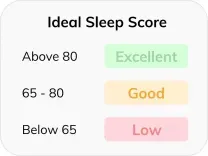Sleep Score and Breakup
Sleep is a complex process. Contrary to the popular belief that the brain and body shut down during sleep, both go through several processes to ensure adequate recovery — from burning calories to clearing neurotoxins to memory consolidation and more. A person’s efficiency during the day is directly related to the quantity and quality of sleep during the previous night. Moreover, it is crucial to maintain a good sleeping regime, in the long run, to continue leading a healthy life.
Dozee Sleep Score
Light sleep is an intermediate or transient stage between Deep and REM stages of sleep. It accounts for almost half the sleep time. In this stage the sleeper has minimum inertial to wake-up hence it is called light sleep. Light sleep also accounts for growth, tissue repair, and memory consolidation but effects are not as intensified as Deep Sleep.Graph with light sleep highlighted:
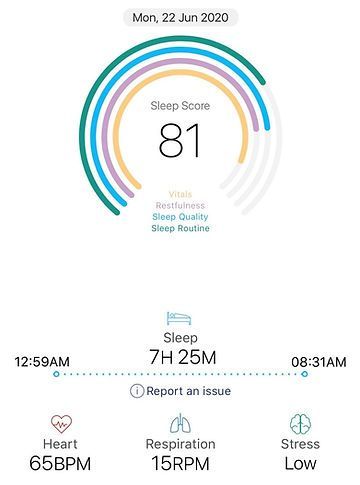
Dozee’s sleep score quantifies the efficacy of your sleep by measuring several parameters related to your sleep including sleep hygiene, physiological state, and restfulness among others.
- SLEEP ROUTINE (20 points) -Sleep routine mainly revolves around the factors that are directly under our control — from sleeping and waking up around the same time to good sleep duration. Sleeping and waking up on time and healthy sleep duration are important to get a fulfilling sleep so that you wake up feeling refreshed.
Different individuals require different amounts of sleep to function normally. It can vary with age, lifestyle, physical and mental stress. A minimum of 6 hours of sleep is necessary to flush out neurotoxins accumulated in the body during the day. It is believed that the accumulation of these neurotoxins may cause serious health issues like Alzheimer’s disease.

Different individuals require different amounts of sleep to function normally. It can vary with age, lifestyle, physical and mental stress. A minimum of 6 hours of sleep is necessary to flush out neurotoxins accumulated in the body during the day. It is believed that the accumulation of these neurotoxins may cause serious health issues like Alzheimer’s disease.

Humans have a natural body clock that is governed by the hormone melatonin secreted by the pineal gland in the brain. At night, melatonin levels go up, inducing sleepiness. In the morning the melatonin levels go down. This melatonin cycle is governed by light, specifically blue light (abundantly available in sunlight). Aligning sleep time with the time when the body is most receptive to fall asleep (when the melatonin levels are going up) allows the body to quickly wind down and get the most out of it. Electronic gadget displays emit a high amount of blue light directly in the faces, which affects the melatonin secretion, and makes it difficult to fall asleep even when we intend to, disturbing the circadian rhythm. Avoiding the use of such screens at least 30 minutes before bedtime can significantly reduce the time it takes to fall asleep.
Another important aspect of a good sleep routine is to sleep around the same time every day. Dozee calculates bedtime resistance as the variation of your actual bedtime from the desired bedtime. 15–30 minutes on either side of the desired bedtime is absolutely normal, however, a highly irregular bedtime can make it difficult for some people to fall asleep quickly which in turn can also affect their wake up time.
- SLEEP QUALITY (40 points) -A good sleep composition includes a sufficient amount of Deep and REM sleep as well as a high sleep efficiency. Deep sleep is responsible for physical restoration and recovery while REM sleep is related to memory consolidation. Both are equally important for sound sleep. Dozee’s intelligent algorithm identifies these stages along with light sleep. Ideally, an adult human should get about 2 hours of Deep and REM sleeps in an 8-hour sleep.
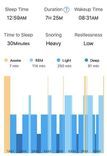
Another parameter for sleep quality is the time taken to fall asleep (sleep latency). Taking 15–20 minutes to sleep from the intention of falling asleep is normal. Taking a long time to sleep while you are in bed with the intention to sleep can be an indication of stress, an unhealthy lifestyle, or some disorder. Dozee also calculates your sleep efficiency, defined as the percentage of time spent sleeping from the time spent in bed. This allows Dozee to quantify the efficacy of your sleep. One of the factors that can lower sleep efficiency is snoring. Snoring usually affects the quality of sleep of the partner as well. Dozee’s proprietary sensing technology identifies each snoring instance while you are sleeping and accounts for that in your sleep quality.
RESTFULNESS (10 points)
Dozee tracks your movements and awakenings to tell you how restful your sleep was. Sleep can be disrupted due to reasons ranging from physiological conditions like stress/pain to environmental conditions like uncomfortable room temperatures or even an uncomfortable mattress. Restless instances are periods of up to a few minutes during which there are heavy body movements. During sleep, our muscles are supposed to be relaxed and therefore we often do experience a few movements. However, frequent and large body movements can affect sleep quality and architecture. Few arousals and awakenings in the night are perfectly normal, but as the number of awakenings go up, the quality of sleep goes down.
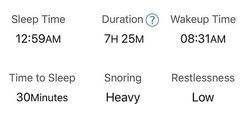
VITALS (30 points)
This accounts for your overnight resting heart rate, respiration rate, and stress. These are compared with your personalized healthy baseline range that Dozee builds over a course of time of you using Dozee. It is normal for both heart and respiration rates to deviate from a healthy baseline for a few instances. This can be due to vivid dreams, nightmares or even room temperature variation. But consistent deviation from a healthy baseline can be indicative of an illness, either in the developing or developed form.
Heart Rate: Heart rate is one of the most fundamental indicators of health. Dozee uses ballistocardiography to accurately detect even minor vibrations produced by the heart when it beats. The most effective way to measure heart health is to monitor the heart rate while at rest, during sleep.
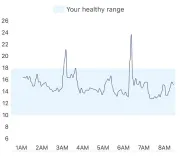
Respiration Rate: A person’s respiration rate is the number of breaths taken per minute. At rest, the normal respiration rate is 12-20 breaths per minute. Anything under 12 or over 25 breaths per minute is considered abnormal.
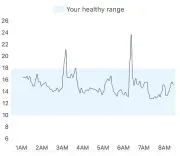
Stress: Traditionally, stress is not considered as a vital sign but it is as important as the other vitals. Dozee uses stress to capture how robust your body’s physiology is to undertake mentally and physically onerous tasks. One of the most important goals of good sleep is relief from stress (both physical and mental) built up during the day. Dozee relies on heart rate variability (HRV) to quantify stress — high stress lowers the heart rate variability and vice versa. Average overnight stress can tell us a lot about the state of our body.
nsidered abnormal.

Ideal Sleep Score
Overall these 100 points constitute the Dozee Sleep Score. This score attempts to measure major aspects of your sleep. This score can be used to track how small lifestyle changes can help improve your sleep quality, such as physical exercise or diet.
